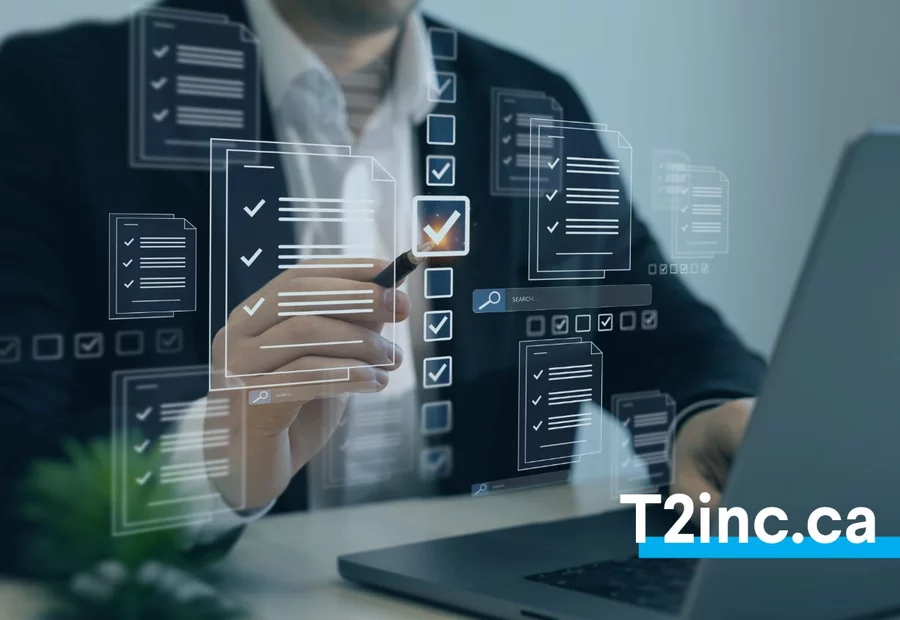Small Business Accounting Tips and Advice

When you start your business, there are dozens of things to think about that it's easy to forget the basics: accounting. It is easy to forget the basic fact that bookkeeping is a necessity.
Accounting is essential to meet both the needs of your company's visibility and the tax authorities. Declaring your company's income to Canada Revenue Agency (CRA) is a fundamental step for a financially healthy company. Filing your corporate taxes by yourself can be an interim solution if you have some basic knowledge. Follow these tips to get your business accounting off to a good start.
General business accounting tips
Whether you do your accounting yourself or use a business tax accountant, you benefit from having consistency and impeccable follow-through when you bookkeep regularly. This rigor saves you a lot of trouble, especially when it comes to declaring your business income during tax time.
Transparency and thoroughness greatly reduces the risk of error and the consequences of inept bookkeeping with penalties from the CRA.
Simplicity first
First and foremost, keep your business accounting as simple as possible. Ensure that each document has its own clearly identified filing system. Group them by category whether electronically or in paper. The more precise your system is, the easier it is to find in the event of an audit, conducting year-end taxes or a data search.
Separate your company’s banking transactions
Use the company's bank account as much as possible to pay expenses and collect income from your business. Do not use the company account for personal expenses. A division of your personal and business expenses will give you a better overview of your profitability and make it easier to prepare your tax return.
Supporting documents
Keep all your documents and supporting evidence in case of requests from tax authorities. This includes:
- Pay stubs
- Invoices for business expenses (insurance, rental lease, costs of operating the business, and so on)
- Photocopies of checks
- Statements (bank, credit cards, line of credit, loans received, and so on)
You must archive and keep these business records for six years. It is recommended to digitize your documents wherever possible because ink has a tendency to fade over time.
Keep a transaction journal
Keep a log of all your company's expenses, including information essential to good bookkeeping:
- The method of payment
- Bank account information
- Description of expense
It is best to avoid paying your expenses personally, but if you do, make a note of this information, and keep the proof of payment for tax purposes. Cash transactions are more difficult to support in the case of an audit. It is better to use a card, cheque or money order to pay.
Sales: cash-in/cash-out records
It is important to keep reliable accounting records. Keep a complete sales log specifying the source of income and the method of payment (by credit, interact, PayPal, petty cash, and so on). This also includes the register receipts and tapes.
In addition, statements and disbursement logs of your bank accounts should be kept. This adds a necessary explanation for each transaction in and out of your business' bank account. These logs must be kept electronically or in paper format six years after the end of the tax year.
List your business activity
Keep a year-end list of your closing inventory, unpaid accounts receivable from your customers, and accounts payable to your vendors. This is big task to do – it is important to oversee and manage the day-to-day operations of your business by keeping logs. If you wait until the end of your tax year to do these lists, it can cause a massive headache and eat up lots of your valuable time.
Make photocopies
Photocopy all your tax forms sent to the tax authorities (GST/QST report, T2 tax form, etc.) if you file your tax reports in print. If you file electronically, print a copy and save those documents in your filing system. It is always your responsibility to be able to produce the documents, even in case of loss, theft or fire.
Business vehicle expenses
If you use your own vehicle for business purposes, you may be entitled to business vehicle tax deductions. The company will reimburse you annually based on the mileage driven for business purposes. Keep a record of the number of kilometers for all your business trips by also specifying the location, date and purpose of each trip.
Use the cloud
You might be thinking that you won't be able to find your way through all these logs and records. Your business accounting records should be extensive. There are various accessible and convenient cloud-based software options available to you. These software options can offer you the chance to take advantage of pre-designed templates and charts for your accounting.
Some small business accounting basics
Business taxation involves filing tax documents within a specific time frame to avoid penalties. Before we get into that, we need to know the basics of business accounting: corporate financial statements.
In order to produce them, it is important to have recorded all your financial transactions in an accounting software. You must enter all data such as your revenues (invoices from your customers with the date, amount, description, and applicable taxes) and your business expenses (costs of rent, payroll, insurance, and etc).
Income statement
This first financial statement gives you a fair look at the profits or losses your business has made in each period. Simply put, it's your revenues, from which your expenses are subtracted.
Cash flow statement
As a business owner, you should also be able to know the amounts of your cash deposits and withdrawals. You need to know how much money you are supposed to receive from your customers and what you have to pay to your suppliers. With these figures you can calculate whether you will have enough capital to pay your bills and expenses.
The cash flow statement is one of the most important financial statements. It is an indispensable management tool because it is very useful for forecasting financing needs. Plus, it helps to avoid running out of cash!
Balance sheet
By combining all the data you collected to produce the first two financial statements, you can prepare the last one: the balance sheet.
Unlike the income statement (revenues - expenses = profit (or loss)), which corresponds to a given period of time (annual quarterlies), the balance sheet is a fixed-date financial statement. It therefore does not cover a time period, but rather provides a portrait of the company's finances at a specific moment in its operation. In effect, the balance sheet includes all other revenue and expense items that do not appear on the income statement.
A simple way to think of the balance sheet is as a personal financial statement, which includes assets (property owned, machinery, business vehicles, and so on), liabilities (debts, loans, payables, and so on) and the owners' final equity accounts. It is like a photo taken at a specific moment and that the bookkeeper will analyze. For a business owner, the goal should be to have total assets greater than total liabilities.
Where to find help with business accounting
The information about business taxation is diverse, complex and varied, so it's best to turn to a professional who specializes in business accounting. Here are some tips to help you find the right business accounting consultant.
Tips for hiring a business accountant
If you are looking for help with your company's bookkeeping, the corporate accountant will be the professional best able to assist you.
The accountant is the custodian of a company's accounts. They are the one who will analyze the financial situation of your company in order to define the accounting budgets. They keep an eye on all the operations carried out, whether those are purchases, sales or expenses for new material. They will determine the annual and monthly balance sheets of your company in order to be able to advise you moving forward.
The accountant is an essential element of a company to make your GST/QST tax report. If you do not have a dedicated accountant, you can call upon an external service provider to perform these functions.
Hire a business tax specialist
Corporate taxation is a very complex field, intimately linked to corporate accounting. It is difficult for the manager of a company to know all the tax rules determining their rights and duties.
The tax specialist acts as an intermediary between the company and the tax authorities. If you wish to optimize your tax situation or if you wish to optimize your tax reports with all the deductions available to you, the tax specialist is the professional you need.
This professional advises you and accompanies you in all the steps related to the taxation of your company. They are also a great help when creating your company and will guide you towards the most appropriate title for your company. For all these reasons, the use of a corporate tax specialist is just as essential as any employee.
Corporate tax lawyers are an asset
The use of a corporate tax lawyer is appropriate if you need help in a dispute with the tax authorities or to incorporate your business. This professional has a significant expertise and can accompany you in several matters related to the maintenance of your company.
In addition to having all the necessary knowledge in taxation, the tax lawyer is also able to plead in court on your behalf, contrary to a tax specialist who will act more as a consultant. This is in the case if you are facing tax litigation.
Professional tax experts are here to help
Accountants, tax specialists and tax lawyers are professionals who specialize in their own field. They complement each other but have their own special purpose. The use of one of these experts differs according to your needs. An accountant, for example, will not be able to plead for you in court if you are facing a dispute. They can, however, provide you with the necessary tax and business accounting knowledge to ensure that your business is financially sound. Over the course of your career, you will likely call on one or all of these three professionals.
In addition to offering online solutions for your business taxes, T2Inc provides you with experts in any field. Whether it's an accountant, a tax specialist or a tax lawyer, we have the expert business accounting advice for your business needs. Contact us now for ease of mind.
Contact our experts
Have a question? Need help? Fill out our online form to get help from our experts.
Contact usNeed more help?
Contact us by filling out our form
Are you interested in our services, but would like more information before taking the plunge? Contact us today and one of our tax accountants will be in touch to help you.
At T2inc.ca, we're committed to helping business owners manage their company's tax affairs so they can grow their business.




